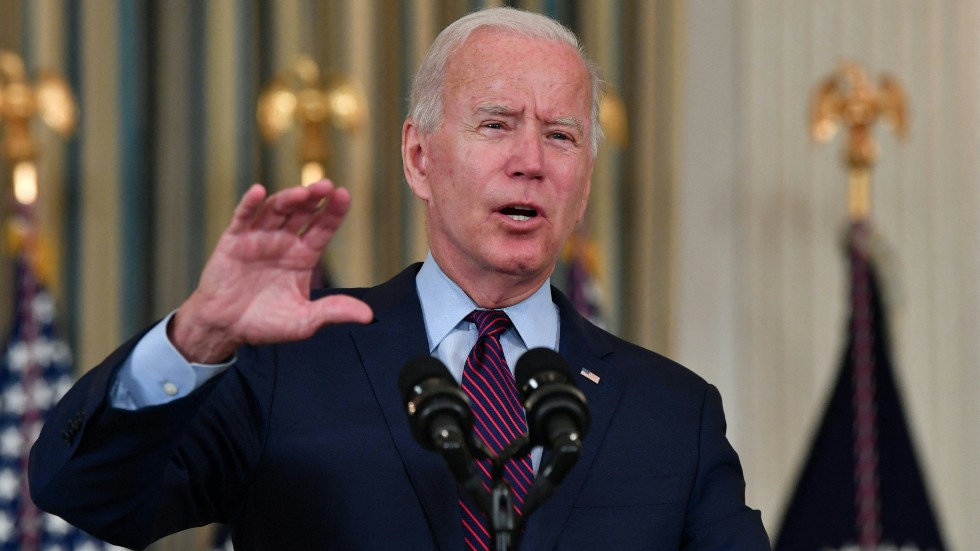Overnight Defense & National Security — China steps up saber rattling

It’s Monday, welcome to Overnight Defense & National Security, your nightly guide to the latest developments at the Pentagon, on Capitol Hill and beyond. Subscribe here: digital-stage.thehill.com/newsletter-signup.
Chinese warplanes have violated Taiwan’s airspace nearly 150 times over the course of nearly four days, sending 52 warplanes through the area on Monday alone.
We’ll break down the Biden administration’s message to China, fears over a military confrontation and how Beijing responded.
For The Hill, I’m Ellen Mitchell. Write to me with tips: emitchell@digital-stage.thehill.com.
Let’s get to it.
Biden administration puts China on notice

The Biden administration is warning China over its increasing provocations against Taiwan, a critical flashpoint amid the ongoing poor relations between Washington and Beijing.
Taiwan raised the alarm after Chinese warplanes violated its airspace nearly 150 times over the course of nearly four days, leaving top Taiwanese — and some American — officials worried about a military confrontation.
A warning from the White House: “We urge Beijing to cease its military diplomatic and economic pressure and coercion against Taiwan and we have an abiding interest in peace and stability across the Taiwan strait. That’s why we will continue to assist Taiwan in maintaining a sufficient self-defense capability,” White House press secretary Jen Psaki told reporters Monday.
What’s the relationship?: The U.S. has a unique relationship with the tiny island territory, providing military and other types of support since Taiwan severed ties with Beijing in 1949 at the end of China’s civil war. But the U.S. has held back from creating official ties with the territory as part of agreements with Beijing.
Taiwan considers itself the legitimate government of the Chinese people while Beijing criticizes it as a rogue territory. Taipei and Beijing have gone through periods of rapprochement, but the Chinese Communist Party has increasingly threatened reunification through military intervention.
Beijing also takes exception with Washington’s support of Taipei, accusing the U.S. of meddling in internal Chinese affairs.
Worsening relations: The Biden administration says it is not seeking conflict with Beijing, but relations with China nevertheless seem to be growing more tense on a number of fronts.
U.S. Trade Representative Katherine Tai said Monday that she will begin direct talks with her Chinese counterpart to press Beijing about its failure to comply with aspects of the Trump-era “phase one” trade pact.
And the administration has sought to shore up its alliances to better direct resources toward countering Chinese influence in the Asia-Pacific region, last month announcing a new pact between the U.S., United Kingdom and Australia to cooperate on security, which in part involves helping Australia acquire nuclear-powered submarines.
Lawmakers weigh in: There is strong, bipartisan support in Congress for close relations between the U.S. and Taiwan.
The island nation is viewed as a democratic bulwark against the ambitions of the Chinese Communist Party, and a key U.S.-trading partner for essential commodities like semiconductors and electronics.
“China’s intimidation tactics will only redouble our commitment to stand up for our democratic friend, Taiwan,” Rep. Gregory Meeks (D-N.Y.), chair of the House Foreign Affairs Committee, tweeted on Monday.
Likewise, Senator Jim Risch (R-Idaho), ranking member of the Senate Foreign Relations Committee, denounced China’s provocations in the region and called for supporting “the people of Taiwan,” in a tweet on Monday.
China’s response: “Taiwan belongs to China and the U.S. is in no position to make irresponsible remarks,” Chinese Foreign Ministry Spokesperson Hua Chunying said in a statement on Monday, reacting to warnings issued by the Biden administration.
TAIWAN PREPARING FOR POSSIBLE WAR
Taiwan is preparing for potential war with China following a series of increasingly aggressive military activity from Beijing, with Taipei’s foreign minister warning that should the nation attack, it would “suffer tremendously.”
China on Monday sent 52 military aircraft into Taiwan’s airspace, the largest military provocation seen yet.
In anticipation of further aggression, the self-ruled island is preparing to repel any strike and has asked Australia to increase intelligence sharing and security cooperation, Taiwanese Foreign Minister Joseph Wu told the Australian Broadcast Corporation’s “China Tonight.”
Taiwan’s pledge: “The defense of Taiwan is in our own hands, and we are absolutely committed to that,” Wu told ABC’s Stan Grant in an interview to be broadcast Monday.
“I’m sure that if China is going to launch an attack against Taiwan, I think they are going to suffer tremendously as well.”
Supreme Court declines to hear Oracle’s JEDI challenge
 The U.S. Supreme Court on Monday declined to hear Oracle’s suit challenging how the Pentagon awarded its now-canceled $10 billion cloud computing contract.
The U.S. Supreme Court on Monday declined to hear Oracle’s suit challenging how the Pentagon awarded its now-canceled $10 billion cloud computing contract.The Supreme Court said it won’t review Oracle’s appeal of a federal court ruling that found that the software company was not hurt by any errors the Pentagon made in awarding the Joint Enterprise Defense Infrastructure (JEDI) contract, as Oracle would not have qualified for it.
Some background: The Defense Department in 2019 awarded the potential $10 billion cloud computing project to Microsoft but was forced to cancel the effort in July after the program became mired in legal battles.
For the next iteration of the program, known as the Joint Warfighter Cloud Capability (JWCC), the Pentagon plans to split the work between multiple companies, potentially Microsoft and Amazon.
Oracle in 2018 first sued to protest the Pentagon’s intention to award the lucrative contract to a single company. It also alleged that several DOD employees had conflicts of interest involving Amazon, which also sought the award.
Oracle’s argument: Though JEDI has since been axed, Oracle wanted the highest court to hear its appeal to make sure that its concerns over JEDI do not reoccur in the JWCC contract process.
“Cases do not become moot simply because a defendant issues a press release claiming to have ceased its misconduct,” Oracle argued in a brief filed to the Supreme Court in September.
Tomb of Unknown Soldier has first all-female guard change

For the first time in history the Tomb of the Unknown Soldier had an all-female guard change last week, 84 years after the memorial was erected at Arlington National Cemetery.
The U.S. Army Old Guard announced in a tweet on Friday that history was made on a recent Autumn morning at the Tomb of the Unknown Soldier when, on the 30,770th day of continuous guarding, an all-female guard change took place with the 28th Sergeant of the Guard.
The Tomb of the Unknown Circle is a memorial in Arlington National Cemetery that is meant to honor unidentified service members who died in combat. The memorial typically draws large crowds of tourists.
ON TAP FOR TOMORROW
- The Center for Strategic and International Studies will discuss “Beyond Security: South Korea’s Soft Power and the Future of the U.S.-ROK Alliance in a Post-Pandemic World, at 9 a.m.
- The European Council on Foreign Relations will hold a discussion on “Waves of Ambition: Russia’s Military Build-up in the Black Sea, at 9 a.m.
- The Senate Armed Services Committee will meet to consider the nominations of Gabriel Camarillo for undersecretary of the Army; Andrew Hunter for assistant secretary of the Air Force for acquisition, technology and logistics; Rachel Jacobson for assistant secretary of the Army for energy, installations, and environment; and Alex Wagner for assistant secretary of the Air Force for manpower and Reserve affairs at 9:30 a.m.
- The Senate Banking, Housing, and Urban Affairs Committee will hold a hearing on “Afghanistan’s Future: Assessing the National Security, Humanitarian and Economic Implications of the Taliban Takeover, at 9:45 a.m.
- The Senate Foreign Relations Committee will meet to consider several State Department nominations at 10:15 a.m.
- NATO Secretary General Jens Stoltenberg will speak at a Brookings Institution event on “NATO in a Competitive World,” at 12 p.m.
- The Hudson Institute will host a discussion on “The Iran Nuclear Showdown: What’s Next?” at 12 p.m.
- The House Foreign Affairs Committee will hear from former State Department and White Officials, including former national security advisor H.R. McMaster, on “Afghanistan 2001-2021: Evaluating the Withdrawal and U.S. Policies, Part II, at 1 p.m.
- The Senate Foreign Relations Committee will meet again to consider several more State Department nominations at 2:30 p.m.
- The Senate Intelligence Committee will hold a closed briefing on intelligence matters at 2:30 p.m.
WHAT WE’RE READING
-
Senators warn of Chinese technology threats ahead of international meeting
-
Defense contractor accused of bilking Navy out of $50 million
-
Majority in US favors refugee status for Afghans who worked with Americans: poll
-
Russia says it launched hypersonic missile from submarine for first time
-
Supreme Court remands border wall challenge following ‘changed circumstances’ under Biden
-
Women command VMI, Citadel cadets in a historic first
-
US ‘very concerned’ about China’s ‘provocative military activity near Taiwan’
-
Alleged English-speaking narrator of ISIS propaganda videos facing federal charges
The Hill: Opinion: Betting on a ‘new’ Afghanistan? Forget it
That’s it for today. Check out The Hill’s defense and national security pages for the latest coverage. See you Tuesday.
{mosads}
Copyright 2023 Nexstar Media Inc. All rights reserved. This material may not be published, broadcast, rewritten, or redistributed. Regular the hill posts








